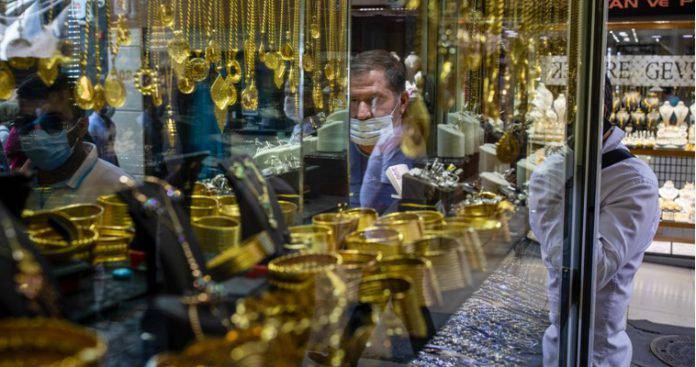Giorgos Iliopoulos: Erdogan’s fatal mistakes in the economy
06/12/2020
After the Central Bank of Turkey raised interest rates by 475 basis points on November 20, to 15% (in the battered Iranian economy it reaches 18%), the course of the Turkish currency will depend more on the mood of Turkish citizens in relation to the moods of foreign exchange markets.
For the past two years, Turkish citizens have been facing the problem of their shrinking finances, watching their national currency sinking in foreign exchange markets against the dollar and the European common currency and inflation rising threateningly to 12%. The real inflation, according to Johns Hopkins University, is moving towards levels of 40% since the beginning of 2019, a fact that places the country in the top 10 in the world that are trying to survive in an environment of hyperinflation.
The situation brings back memories of financial instability that have plagued the country for decades, with most citizens reacting by turning to foreign exchange markets (dollars and euros) and of course gold to protect themselves, intensifying the catastrophic dollarization of the Turkish economy.
Official data from the central bank on November 20 confirmed that Turkish citizens hold the incredible amount of $ 225.8 in foreign currency and gold, which increased by $ 1.5 billion in one week. Foreign exchange now represents 58% of deposits in current and savings accounts, when at the end of last year it had moved close to 50%.
Despite the restructuring of the financial staff, the installation of a new central banker, and finally the large increase in interest rates, the bleeding in the national currency continues. The main downside of the deteriorating situation stems from the fact that Turkish depositors are skeptical even at these interest rates whether their banks retain the ability to protect their deposits in the national currency.
A dramatic past
Most Turks have experienced tragic situations since the beginning of the new century, before the sudden monetary turmoil of August 2018, on the occasion of the US-Turkey confrontation in which the central figure was an imprisoned American pastor. The generally fluid situation, although short-lived, is dragging the economy into a financial crisis and causing a recession.
In 2005, the government of then-Prime Minister and current President Erdogan implemented a sharp one-time devaluation of the Turkish lira, removing 6 zeros from the currency. At the time, the smallest currency in circulation was the 50,000 lira note, with Erdogan claiming that the sudden move would end the long-term devaluation of the national currency, finally burying a long period of shame and restoring its dignity.
However, the 50,000 note before the devaluation was equal in value to just $ 0.04, with the result that at the end of December 2004 the exchange rate of the US dollar against the Turkish pound reached 1: 1,350,000, while after 1950 the corresponding exchange rate was only 1: 2.8. The great economic crisis of 2001 leading the country to the IMF caused an uncontrollable rise in inflation to 70%, although twelve months later with the rise of Erdogan’s party to power it fell to 30%.
However, after the one-time devaluation, the Turkish currency is constantly appreciating, reaching the exchange rate of 1: 1.15 against the US dollar, ie 2,022.42 old Turkish lira, before the great financial crisis of 2008. However, twelve years after the first ten months of 2020 and before the recent reorganization of the financial staff it broke the barrier of 1: 8 against the American dollar, and in correspondence with the old Turkish lira the exchange rate is set at 1: 10,800,000!
Fatal mistakes
The economic policy of the last two years has unfortunately revived the memories of the country’s tragic past, with the Erdogan regime, even before the terrible turmoil of August 2018, abolishing all the economic rules set by the IMF, allowing the spectacular recovery of the Turkish economy.
Apart from the removal of even the last vestiges of central bank independence, all financial and economic schemes are coming under the control of the regime, with the most obvious examples being the state-controlled banks, which are withdrawing from the supervision of the Turkish parliament and joining a new state financial institution with characteristics of a national fund (Turkey Wealth Fund).
With his victory in the 2018 presidential elections, Erdogan gained new and disproportionately large executive powers, while the parliamentary regime was transformed into a presidential one, with the president controlling almost everyone and everything. He immediately rushed to appoint his son-in-law, Berat Albayrak, as finance minister, removing Naci Ağbal, an experienced economist and former Merrill Lynch executive. He also took over as chairman of the Turkey Wealth Fund and in the coming months replaced most of the top executives of the former autonomous and independent public body that calculates inflation and the fundamental economic figures of the country, with persons he controls.
Borrowing explosion
Following in the footsteps of his father-in-law, Berat Albayrak activated a credit mechanism that caused domestic debt to explode, taking advantage of low interest rates being the main lever. With the main goal of getting Turkey out of its recessionary environment, state-controlled banks lent tens of billions of lira, while private financial institutions were encouraged to pursue the same credit expansion policy.
In fact, in order to gain complete control, Erdogan and Albayrak expelled on 6 July 2019 the central banker Murat Cetinkaya, who until then had kept interest rates at 24% to avoid pressure on the national currency. His successor, Murat Uysal, has been meekly steadily lowering interest rates to 8.25% in May 2020, squeezing them 3.1 percentage points below official inflation. The move, however, is putting pressure on depositors who now have to deal with the problem of their deposits gradually depreciating, as annual inflation persistently remains significantly higher.
The explosion of borrowing, coupled with dangerously low interest rates, has left foreign exchange reserves in dire straits as the central bank is forced to sell billions instead of taking advantage of fluctuations in interest rates to protect the currency.







